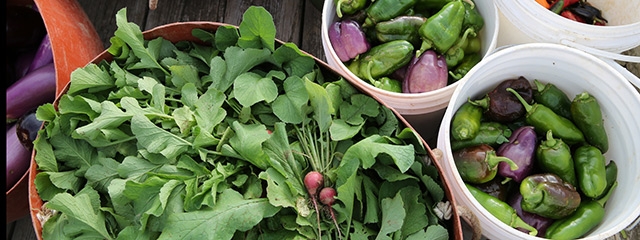In the series “Student Voices,” current students write about the reasons they chose Hampshire and how our educational model works from their perspective.
It’s another bright Tuesday morning on campus, but noticeably more crisp and cool than the last. After eating a quick breakfast of oatmeal, my modmate Miranda and I jump onto our bikes and ride through the bumpy dirt trail towards the farm. We lean our bikes on the side of the barn and walk inside – there we are greeted by Nancy, the farm manager, her pug, and various community members. It’s farm share day on Hampshire campus!
Hampshire College’s CSA Program
Since the school’s beginning in the 1970s, the farm has been a central part of our palate, community life, and collective identity. Students can work on the farm and harvest the very vegetables that end up in our dining hall. It’s also a classroom for various courses, from animal behavior and psychology to hydrology and organic chemistry. My favorite part of the farm is the CSA program, or Community Shared Agriculture. There, once a week, my modmates and I can pick up a plethora of fresh vegetables, flowers, and herbs from just paying a one-time fee – colleges with CSAs are a truly wonderful thing. The program serves over 200 members and stretches out beyond the Hampshire campus to the greater Pioneer Valley community. CSAs are a great way to support local and organic agriculture, understand more deeply where your food comes from, become closer to your community, and try some interesting root vegetables you may have never seen before.
Now that it’s getting cooler and the fall growing season is winding down, there are increasingly more vegetables we simply don’t know what to do with. Miranda and I fill up our bags with the usuals that our mod always gobbles up quickly: spinach, broccoli, sweet potatoes, leeks, garlic, butternut squash, sugar pumpkins … our fridge will be filled with fresh and yummy vegetables yet again! But now there’s more of the mysterious root vegetables and winter radishes that we’ve simply never seen or heard of before, so it’s a good opportunity to learn new flavors and ways to cook them.
As the season winds down we also begin receiving fresh ears of popcorn, and we were able to learn the charismatic history of its life on the farm from Nancy. Mr. Warner, a farmer who used to own the land the farm sits on, was famous in the area for his red popcorn kernels. When a Division III (senior) student interviewed him for her project on seed saving, he gave her some of the famous seeds, so now the farm is able to steadily grow them for all to enjoy.
We load veggies, popcorn, and herbs into the milk crates attached to our bikes and ride through the farm again, absorbing some of the few remaining sunny and mildly warm days of New England. It’s just another thing we love about Hampshire – the commitment to farm-to-table eating and nurturing the health and community of the area.






